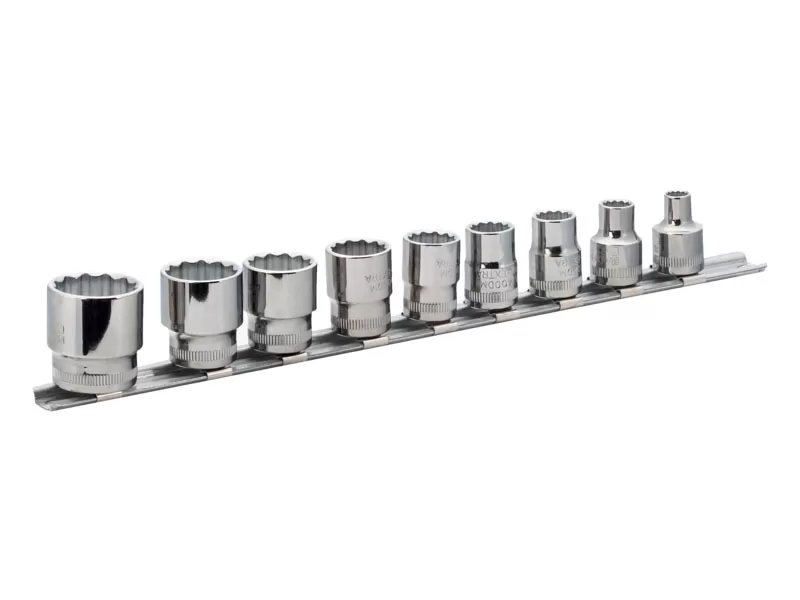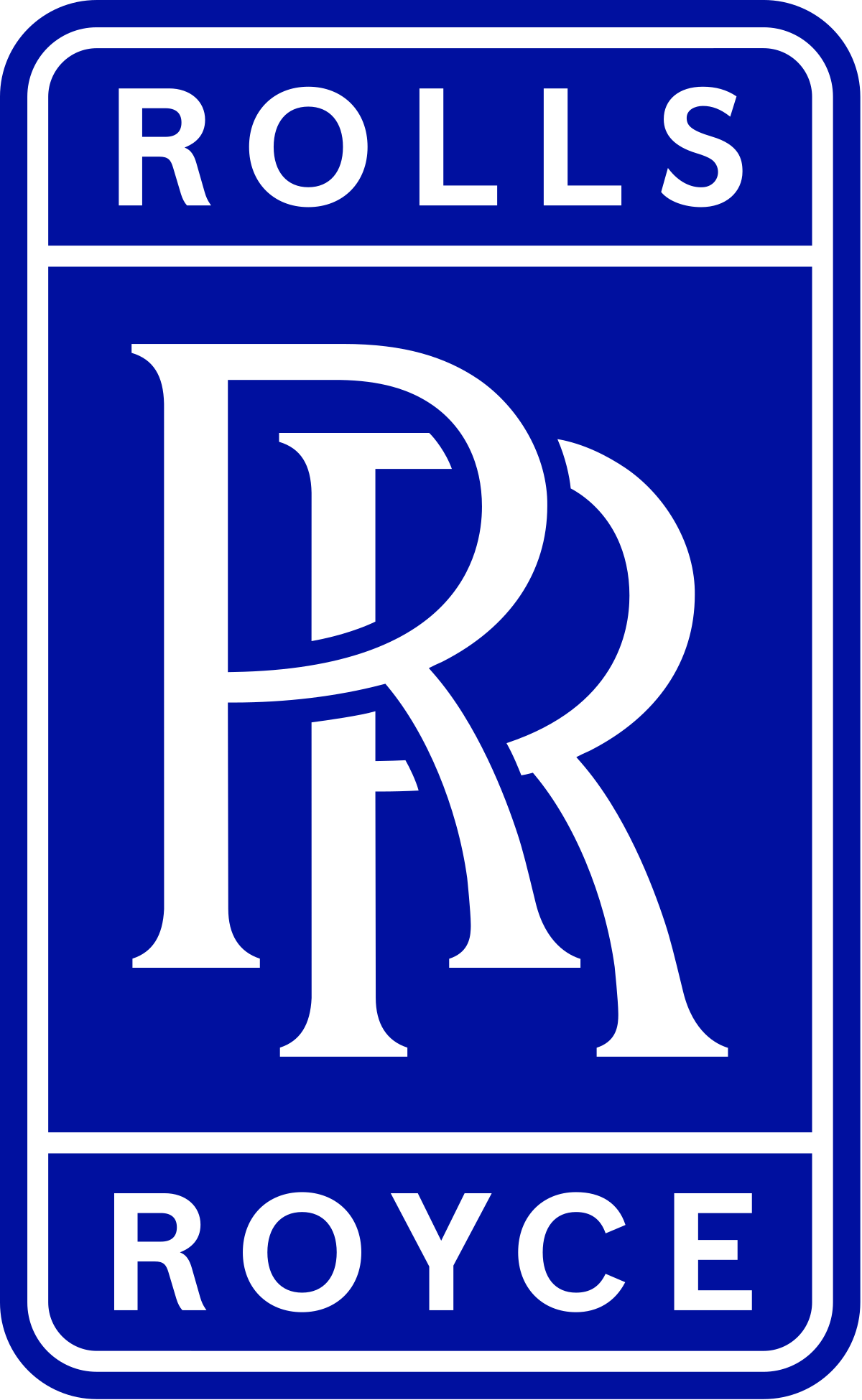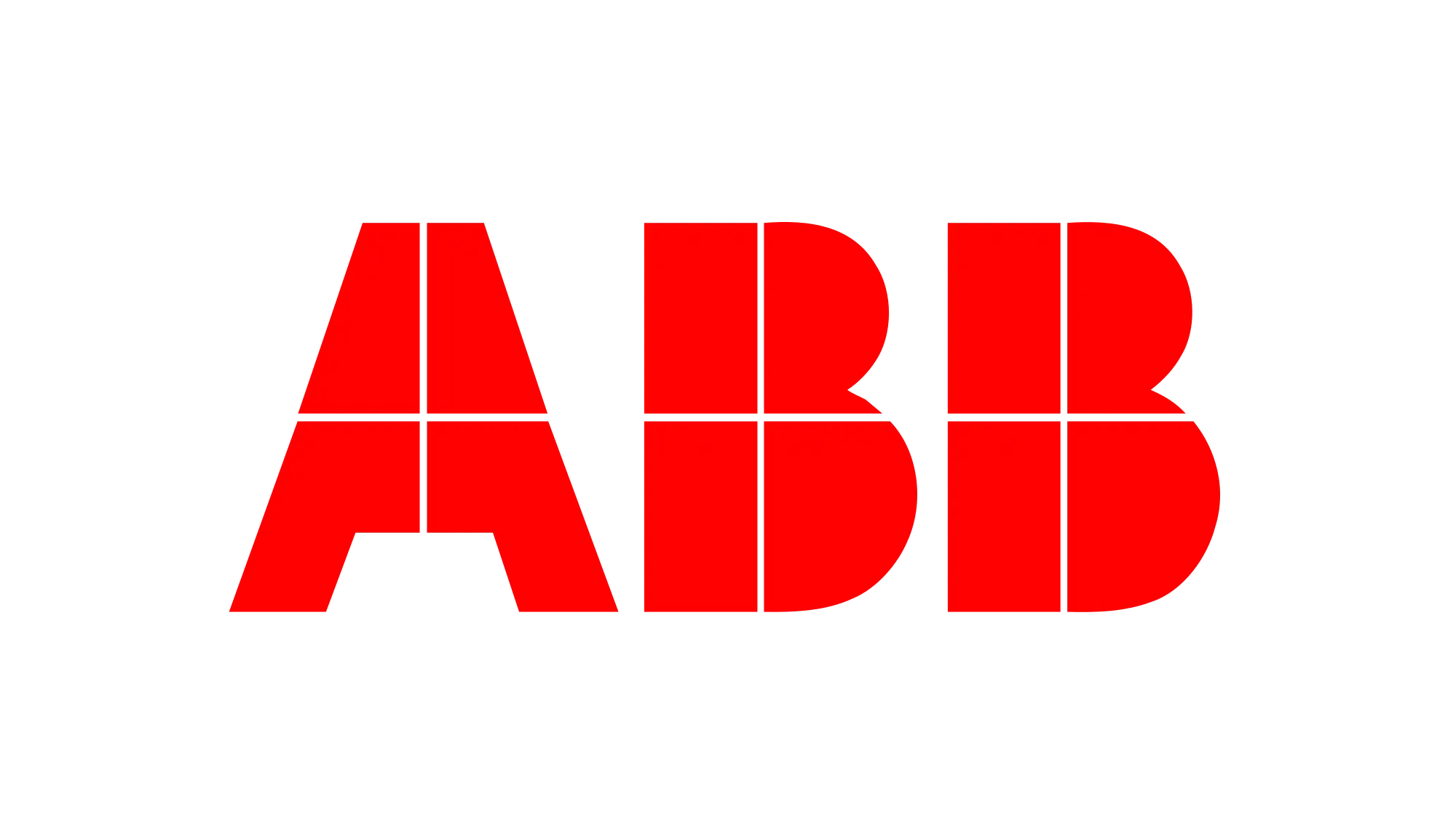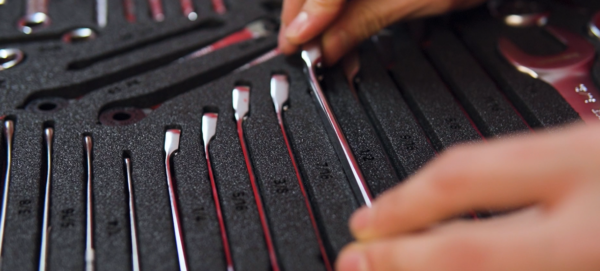What Are Socket Sets?
Socket sets are a collection of tools, designed to help you to tighten and loosen fasteners such as nuts and bolts. They typically contain a range of sockets in differing sizes, as well as components such as rachets, drivers, and extensions, to help you to apply torque to turn the socket when it’s placed over the fastener.
Socket sets are available in both metric and imperial sizes, as well as different shapes and materials. They offer a good alternative to a traditional spanner or a wrench, helping you to easily remove or tighten nuts and bolts safely – and with minimal effort.
A socket set is ideal for jobs in confined or restricted spaces, which is why they’re one of the most versatile and popular types of hand tool for plumbers, electricians, and mechanics. In this guide, we’ll explain more about the different types of socket sets available, how to choose the right socket set for the intended application, and some simple ways to maintain and care for your socket sets that will help to extend their lifespan.
Different Types of Sockets and Socket Sets
From standard to shallow, spark plug to insulated, (and everything in between!) socket sets come in many different varieties. Which type of socket set you need depends on the size and shape of fasteners you’re using and the environment you’re working in.
Here’s a brief breakdown of the different types of socket sets available:
Standard socket sets
A standard socket set will equip you with a set of sockets in a range of common socket sizes and component parts such as a rachet and extension.
Standard socket sets come in either metric or imperial measurements, each of which corresponds to a specific fastener in the same shape and size. Most standard socket sets offer 6-point and 12-point sockets, which fit with hexagonal (6-point) or bi-hexagonal (12-point) bolt heads.

Deep socket sets
Deep socket sets are designed for jobs in hard-to-reach places.
Deep sockets are longer in length than standard sockets, allowing them to easily access nuts and bolts that are beyond the reach of standard socket sets.
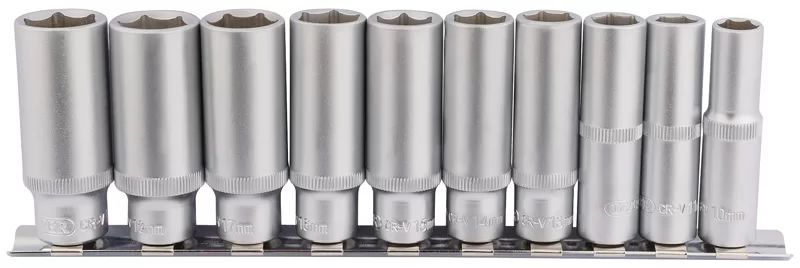
Shallow socket sets
Shallow socket sets or short socket sets are perfect for jobs where access to the fastener is restricted.
Shallow sockets have a lower profile than deep or standard socket sets and are specifically designed to help you reach nuts and bolts in spaces where there is little overhead clearance.
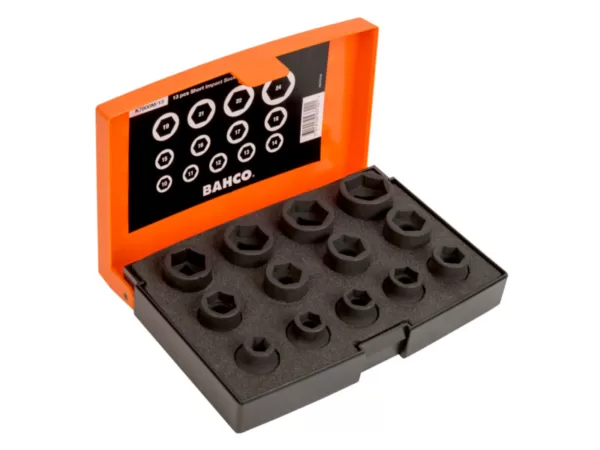
Impact sockets
Impact socket sets are designed to be used with power tools such as electric or pneumatic wrenches.
They’re usually made from thick alloys such as coated chrome molybdenum steel, which is less shatter-prone and anti-corrosive.
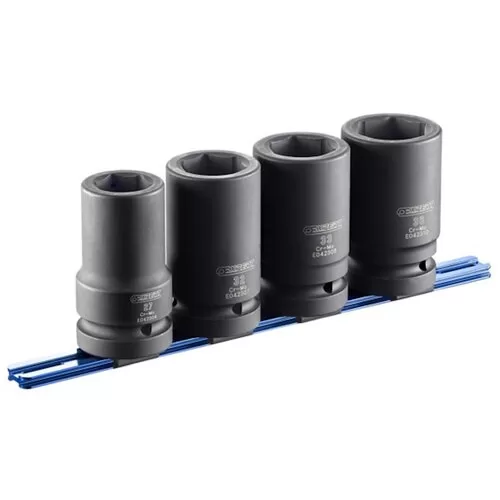
Wheel nut sockets
Wheel nut socket sets are a special type of impact socket set, manufactured for the sole purpose of removing and fastening vehicle wheel nuts.
Wheel nut sockets come in the most common wheel nut sizes and are a must-have tool for mechanics and other automotive applications.
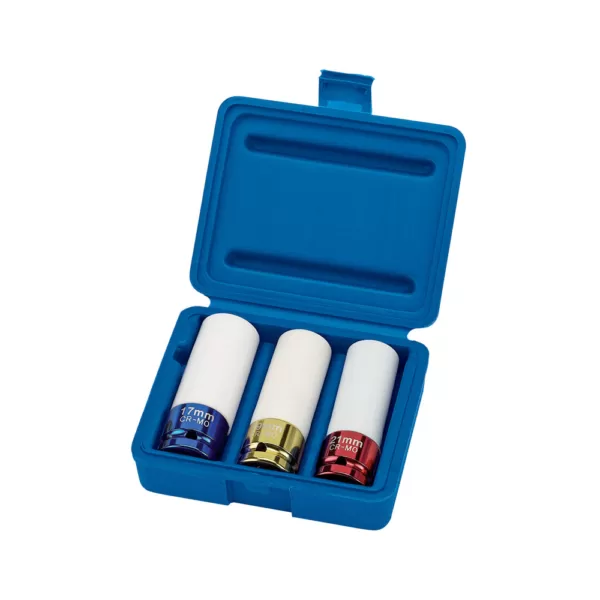
Spark plug sockets
Spark plug sockets are specifically for use with spark plugs.
A spark plug socket set will equip you with a range of sockets, sized to fit most spark plug types. Some spark plug sockets also feature magnets to help hold the spark plug in place during installation.
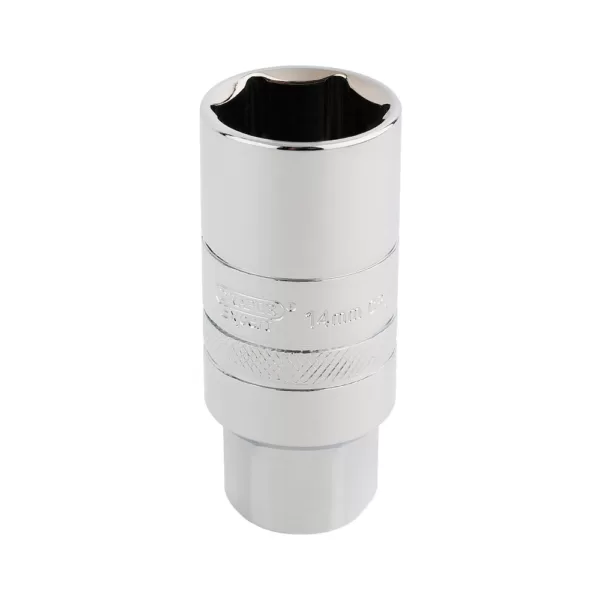
Insulated sockets
Insulated sockets are constructed from non-conductive materials, which protect the user from electric shocks.
They’re an essential tool type for electricians, providing a safer way to remove or fasten nuts and bolts when working with live currents or electronic components.
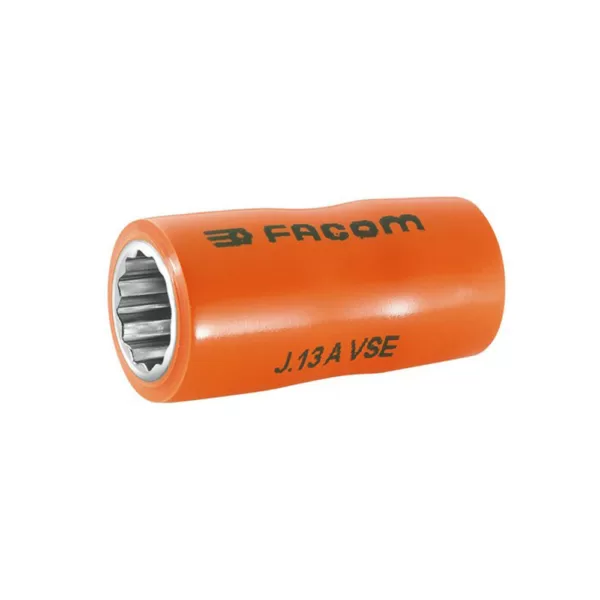
Understanding Socket Sizes
When purchasing a socket set it’s important to take note of the size. Sockets come in two standard sizing systems: imperial and metric.
Imperial sockets are designed for use with imperial fasteners (nuts and bolts that have a bolt head measured in inches and fractions of inches). Imperial sockets are also referred to as SAE (short for the Society of Automotive Engineers) and were once the standard size by which all sockets were measured (and still are in the US).
Many countries, including the UK, now prefer to measure sockets using the more common metric system, which sizes nuts and bolts in millimetres. Metric and imperial sockets aren’t interchangeable, so if you are using a metric socket set this will only correspond to nuts and bolts in metric sizes and vice versa.
To add to the confusion, socket sets are sized using two measurements: the size of the socket head and the size of the drive socket (the part that attaches to the socket). Metric sizing only ever applies to the socket head. The socket drive, on the other hand, is always given as an imperial measurement.
In addition to their metric and imperial values, socket sets are also categorized by three standard sizes: small, medium, and large.
Small sockets generally have 1/4” or 3/8” drive sockets and head sizes of between 3mm to 22mm. Large socket sets normally feature drive sockets of 3/4” or 1” and a head size range of 19mm to 50mm. Medium sockets, meanwhile, sit somewhere between the two, often comprising of a 1/2” drive socket and socket heads of 8mm to 32mm in dimension.
Socket Set Components
Sockets make up just one part of a socket set. The other key components are a rachet and extension bar, both of which can improve the versatility of your sockets and help to widen their uses.
1. Sockets:
The sockets in your socket set fit around the fastener and are sized either in inches (imperial) or millimetres (metric). This size corresponds to the bolt head, allowing you to select the right socket size for the fastener you’re working with.
Sockets also come in different profiles, the most common of which are the 6-point hex sockets and the 12-point bi-hex sockets. These correspond to the shape of the fastener.
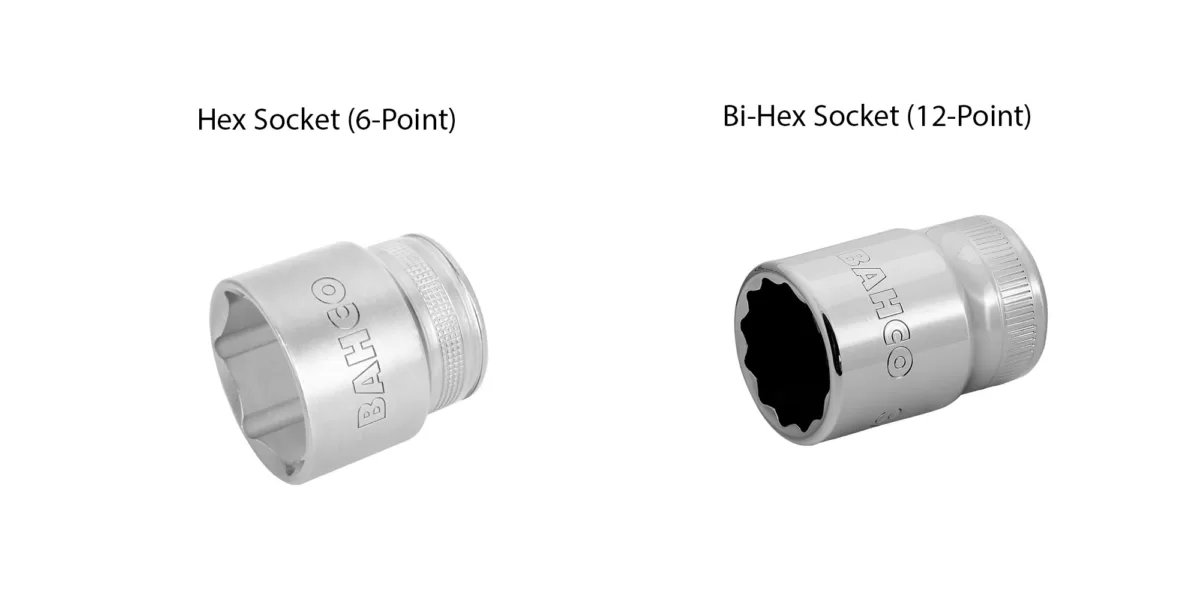
1. Ratchets:
Rachets attach to the socket to allow you to apply the torque needed to turn the fastener. They are multi-directional to enable you to both unbolt and bolt the nut.
Rachets are measured according to their drive size, which is always given in imperial (inches). Common drive sizes are 1/4″, 3/8″, and 1/2″ although larger drives of up to 1” are available. What size rachet you need depends entirely on where the fastener is located. Smaller rachets, for example, are ideal for tight spaces but larger ones require more clearance.
Rachets also feature a tooth count, which dictates how far you need to push the handle to engage the next tooth. The higher the tooth count the less distance you’ll need to turn the handle. Fine tooth rachets (rachets with a high tooth count) typically have a tooth count of 72 to 160 teeth.
The other consideration with rachets is whether you go for standard or quick release. Quick-release rachets enable you to quickly remove the socket from the rachet, by simply pressing a button rather than having to manually remove the socket yourself. This can serve as a great time saver, as well as helping you to switch sockets with ease.

3. Extension Bars:
Extension bars, also known as socket extensions, affix to the rachet (drive end) of your sockets, to help you to reach fasteners in restricted or cramped spaces. Like rachets and sockets, extension bars come in a range of sizes (sized both in imperial and metric measurements). Some of the longest will add 20-24 inches to your socket driver – giving you an incredible ability to access fasteners that are out of reach.
Extension bars are sized according to their input and output drive size, which corresponds to the rachet size you’re using. For this reason, you’ll commonly find socket extensions available in 1/4”, 3/4″, 3/8”, and 1/2″ sizes, which align with the standard drive sizes of small, medium, and large rachets.
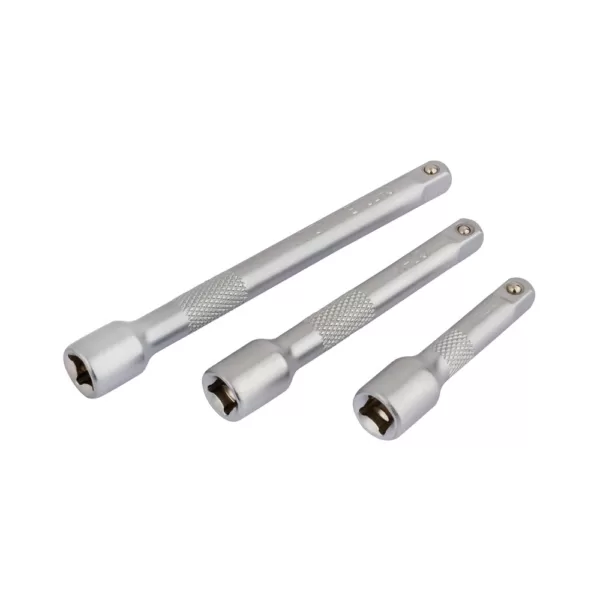
Finish of the socket set
To protect from wear, sockets are typically finished in chrome plating or black oxide (as it the case with impact sockets). Both materials offer non-corrosive properties. The only reason black oxide is favoured for impact sockets is because it chips less easily than chrome and matt chrome coatings.
Heat treatment, CRV, and matt and satin finishes are also applied to sockets to make them more robust, water-resistant, and durable.
Maintenance and Socket Storage
Properly storing and cleaning your tools is essential to maintain their longevity. Socket sets are no exception, and although their coatings provide protection against corrosion, long-term use can degrade your tools if not properly maintained.
The best way to keep your socket sets in prime shape is by keeping them safely stored in a purpose-built socket storage box with shadow foam recesses for each component to sit in. Not only will this protect your socket sets in transit, but it will also help you to easily keep your tools neatly organised.
Other things you can do to prolong the life of your socket sets is to gently clean each component with a soft cloth and brush to remove residual dirt and grime. You should also place your sockets down carefully between uses instead of letting them drop to the floor. This will help to minimise the risk of chips or flakes as well as prevent your tools from going rusty.
Conclusion
Socket sets are a great way of removing nuts and bolts and specialist fastenings such as wheel nuts and spark plugs efficiently and safely.
When choosing which types of sockets and socket sizes to buy, remember to consider the profile and dimensions of the fasteners you’re working with, as socket sets are designed specifically to engage with different sized nuts and bolts (both imperial and metric).
Also important is the application itself and the environment you’re working in. Insulated socket sets are a must when working around electrical components, while impact sockets offer a faster alternative to hand tools but may not be suitable for hard-to-reach spaces.
At Red Box Tools we offer a diverse range of socket sets and accessories for both homeowners and professional tradespeople alike. From spline sockets and universal joint sockets to metric socket sets, socket adaptors, breaker bars, and socket set brands such as Bahco socket sets, our socket set selection makes it easy to find the right sockets for you.



